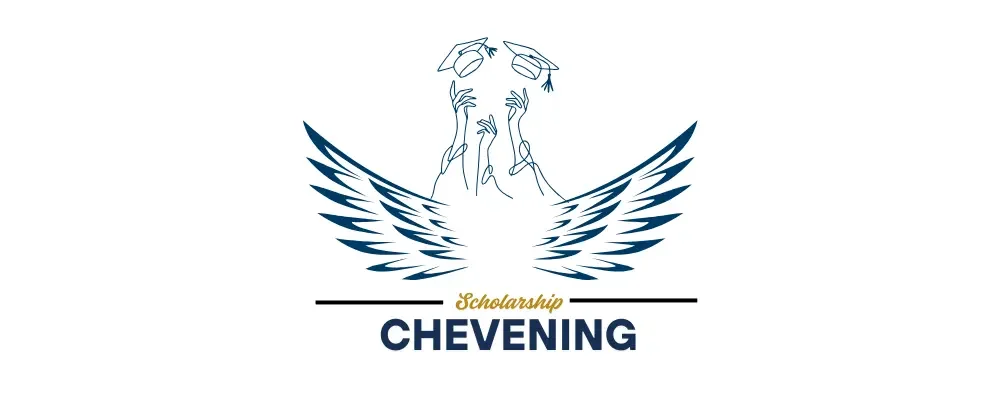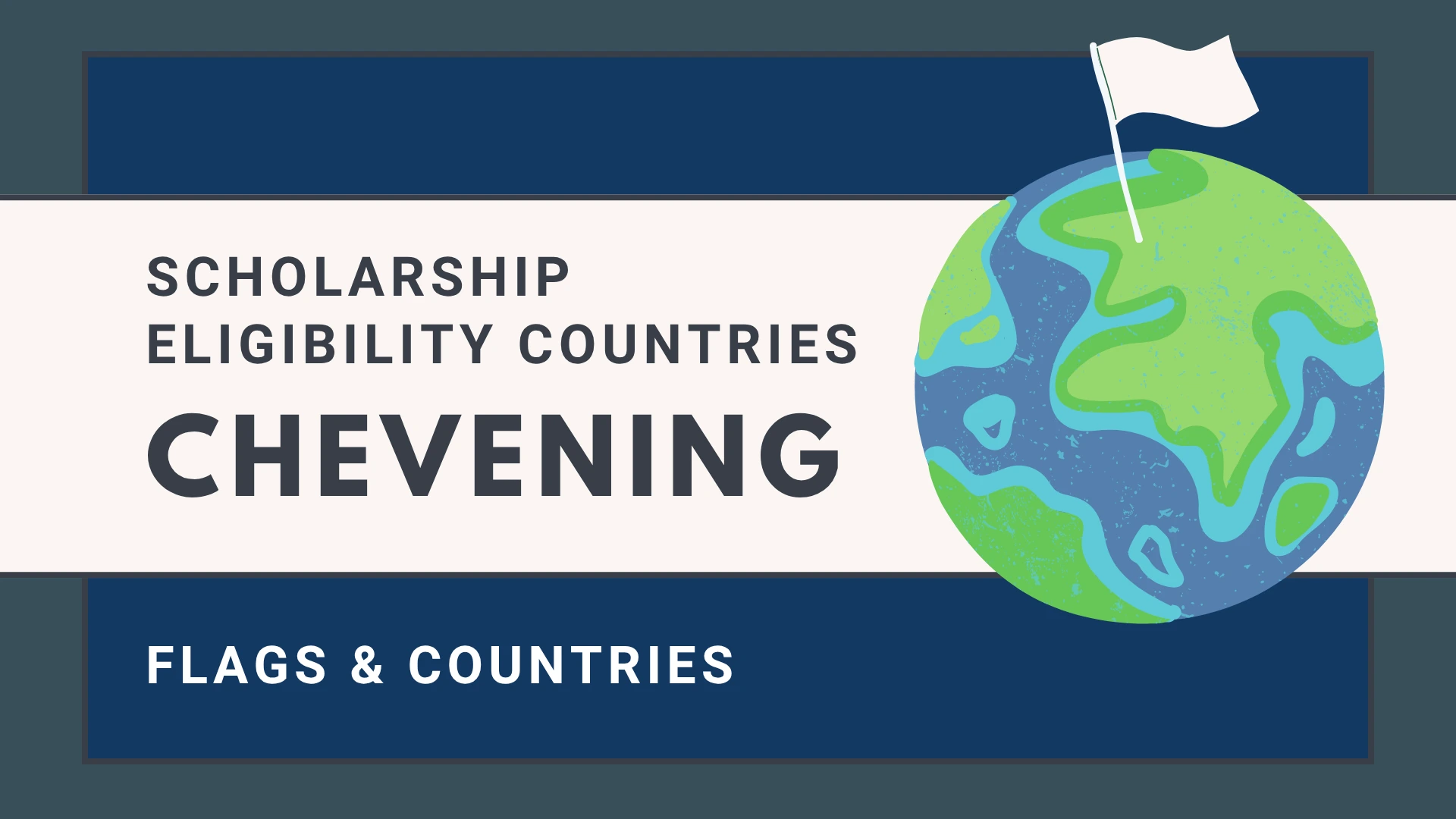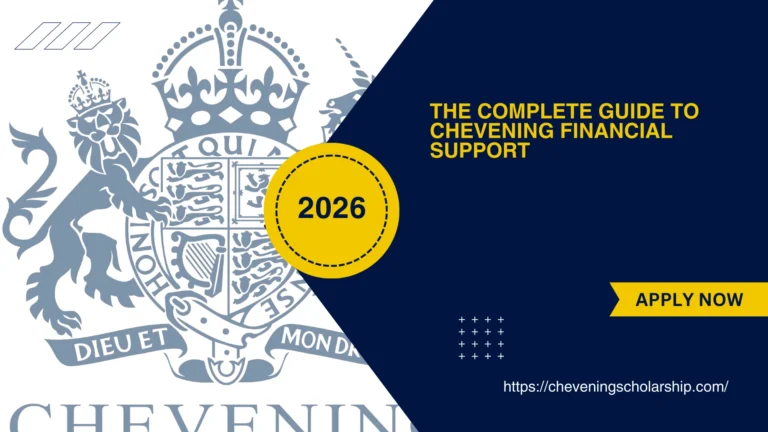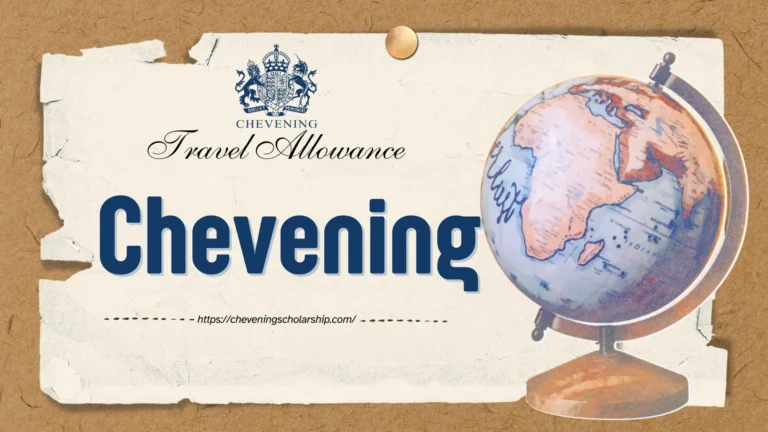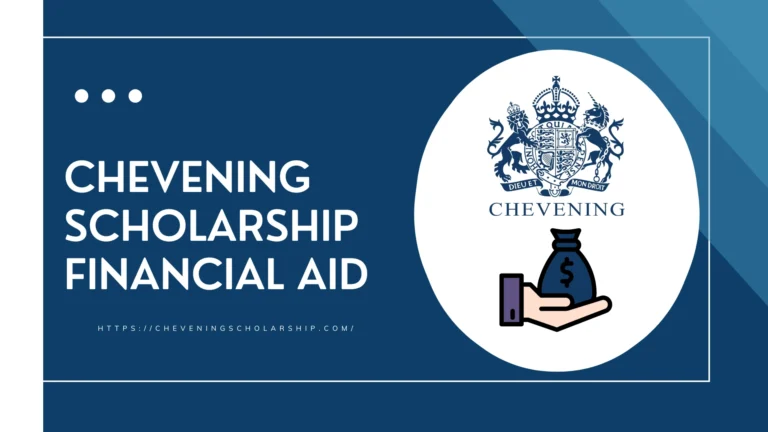Chevening Scholarship Eligibility Countries : Complete Guide to Who Can Apply
Here’s a question that stops thousands of ambitious students in their tracks every year: “Wait, can I actually apply for this?”
You’ve heard about Chevening. You know it’s prestigious. You’ve seen the success stories. But then you hit the Chevening scholarship eligibility countries list and suddenly you’re scrolling frantically, searching for your nation, hoping it’s there, dreading it might not be.
I’ve watched this exact moment play out hundreds of times. The relief when someone from Nepal finds their country listed. The confusion when a UK national discovers they’re not eligible for standard Chevening (plot twist, right?). The frustration when someone realizes their country isn’t included—or worse, when they assume they’re eligible without checking the specific requirements that could disqualify them.
Here’s what makes this tricky: Chevening eligibility isn’t just about your country being on a list. It’s about citizenship status, residency rules, previous UK government funding, dual nationalities, refugee status, and about a dozen other factors that can either open the door or slam it shut.
But breathe. Because I’m about to give you the complete breakdown of Chevening eligible countries 2025, region by region, with all the nuances, exceptions, and insider knowledge you need to know exactly where you stand.
Understanding Chevening Eligibility: The Big Picture
Before we dive into the country-specific lists, let’s talk about what eligibility actually means.
The Core Eligibility Framework
Chevening scholarship eligibility countries operates on a simple principle: the scholarship is for citizens of Chevening-eligible countries who will return home after their UK studies. But the devil, as always, is in the details.
The Basic Rule: You must be a citizen of a Chevening-eligible country or territory. That’s it. Sounds simple, right?
The Complications:
- Dual citizenship with non-eligible country
- Permanent residency vs. citizenship
- Refugee or stateless status
- UK nationals and British Overseas Citizens
- Recently added or removed countries
- Special territory status
What “Eligible Country” Really Means
When we talk about Chevening scholarship eligibility by country, we’re really talking about three things:
1. Citizenship Eligibility: Are you a citizen of a country Chevening supports?
2. Return Requirement: Will you return to your country of citizenship for at least two years after your scholarship?
3. Country-Specific Quotas: How many scholarships does your country receive? (This varies dramatically)
Chevening Scholarships 2024: Everything You Need to Know to Win This Year
The Complete Chevening Eligible Countries List 2025
Let’s start with the master list. Over 160 countries and territories are currently eligible for Chevening scholarships. Here’s the breakdown by region:
Asia and the Pacific: Chevening Eligible Countries Asia
South Asia:
Chevening Scholarship Eligibility Pakistan
- Population: 240M+
- Annual awards: 100-150 scholarships
- Competition level: Very high
- Special considerations: Strong government partnerships, diverse sector focus
- Key sectors: Education, governance, energy, healthcare
Chevening Scholarship Eligibility India
- Population: 1.4B+
- Annual awards: 80-100 scholarships
- Competition level: Extremely high
- Special considerations: Focus on innovation, technology, climate
- Key sectors: Technology, environmental policy, public health
Chevening Scholarship Eligibility Bangladesh
- Population: 170M+
- Annual awards: 40-60 scholarships
- Competition level: High
- Special considerations: Climate resilience, development focus
- Key sectors: Climate adaptation, governance, education
Chevening Scholarship Eligibility Nepal
- Population: 30M+
- Annual awards: 15-25 scholarships
- Competition level: Moderate-high
- Special considerations: Development and governance emphasis
- Key sectors: Public administration, environmental management
Chevening Scholarship Eligibility Sri Lanka
- Population: 22M+
- Annual awards: 15-20 scholarships
- Competition level: Moderate
- Special considerations: Post-conflict development, economic reform
- Key sectors: Economic policy, governance, reconciliation
Chevening Scholarship Eligibility Bhutan
- Population: 800K+
- Annual awards: 5-10 scholarships
- Competition level: Moderate
- Special considerations: Sustainable development, Gross National Happiness alignment
- Key sectors: Environmental conservation, public policy
Chevening Scholarship Eligibility Maldives
- Population: 500K+
- Annual awards: 3-5 scholarships
- Competition level: Moderate
- Special considerations: Climate vulnerability, tourism economy
- Key sectors: Climate adaptation, marine science, tourism management
Southeast Asia:
Chevening Scholarship Eligibility Indonesia
- Population: 275M+
- Annual awards: 60-80 scholarships
- Competition level: High
- Special considerations: ASEAN leadership, diverse sectors
- Key sectors: Public policy, environmental management, Islamic finance
Chevening Scholarship Eligibility Vietnam
- Population: 100M+
- Annual awards: 30-40 scholarships
- Competition level: High
- Special considerations: Economic development, UK-Vietnam partnerships
- Key sectors: Economics, governance, environmental policy
Chevening Scholarship Eligibility Thailand
- Population: 70M+
- Annual awards: 25-35 scholarships
- Competition level: Moderate-high
- Special considerations: ASEAN hub, regional leadership
- Key sectors: International relations, public health, governance
Chevening Scholarship Eligibility Myanmar/Burma
- Population: 55M+
- Annual awards: 10-20 scholarships (status varies with political situation)
- Competition level: Moderate
- Special considerations: Political context affects program
- Key sectors: Development, governance, conflict resolution
Additional Southeast Asian Eligible Countries:
- Malaysia
- Philippines
- Cambodia
- Laos
- Singapore (limited programs)
Central and East Asia:
Chevening Scholarship Eligibility Mongolia
- Population: 3.3M+
- Annual awards: 5-10 scholarships
- Competition level: Low-moderate
- Special considerations: Mining sector, economic diversification
- Key sectors: Economic policy, environmental management
Additional Eligible:
- Kazakhstan
- Uzbekistan
- Kyrgyzstan
- Tajikistan
- Turkmenistan
Pacific Nations:
- Fiji
- Papua New Guinea
- Samoa
- Tonga
- Vanuatu
- Solomon Islands
Africa: Chevening Scholarship Countries Africa
West Africa:
Chevening Scholarship Eligibility Nigeria
- Population: 220M+
- Annual awards: 80-120 scholarships
- Competition level: Very high
- Special considerations: Largest African economy, diverse sectors
- Key sectors: Governance, economic development, technology
Chevening Scholarship Eligibility Ghana
- Population: 33M+
- Annual awards: 30-50 scholarships
- Competition level: High
- Special considerations: Democratic stability, UK partnership history
- Key sectors: Governance, public health, agriculture
Chevening Eligibility Cameroon
- Population: 28M+
- Annual awards: 15-25 scholarships
- Competition level: Moderate-high
- Special considerations: Bilingual (English/French) opportunity
- Key sectors: Education, agriculture, conflict resolution
Additional West African Eligible Countries:
- Senegal
- Sierra Leone
- Liberia
- Gambia
- Chevening Scholarship Eligibility Mali
- Chevening Scholarship Eligibility Mauritania
- Niger
- Benin
- Togo
- Burkina Faso
- Guinea
- Côte d’Ivoire
East Africa:
Chevening Scholarship Eligibility Kenya
- Population: 55M+
- Annual awards: 50-70 scholarships
- Competition level: High
- Special considerations: Regional hub, strong UK ties
- Key sectors: Technology, agriculture, public health
Chevening Eligibility Tanzania
- Population: 65M+
- Annual awards: 30-40 scholarships
- Competition level: Moderate-high
- Special considerations: Tourism, conservation focus
- Key sectors: Environmental management, governance
Chevening Eligibility Uganda
- Population: 48M+
- Annual awards: 25-35 scholarships
- Competition level: Moderate
- Special considerations: Development focus, refugee hosting
- Key sectors: Public health, agriculture, governance
Additional East African Eligible Countries:
- Ethiopia
- Rwanda
- Somalia
- South Sudan
- Burundi
- Djibouti
- Chevening Scholarship Eligibility Eritrea
Southern Africa:
South Africa
- Population: 60M+
- Annual awards: 40-60 scholarships
- Competition level: High
- Special considerations: Economic powerhouse, regional influence
- Key sectors: Economics, governance, public policy
Chevening Eligibility Zimbabwe
- Population: 16M+
- Annual awards: 15-25 scholarships
- Competition level: Moderate
- Special considerations: Economic recovery, governance reform
- Key sectors: Economics, governance, agriculture
Chevening Eligibility Botswana
- Population: 2.6M+
- Annual awards: 5-10 scholarships
- Competition level: Low-moderate
- Special considerations: Stable democracy, diamond economy
- Key sectors: Economic diversification, governance
Additional Southern African Eligible Countries:
- Zambia
- Malawi
- Chevening Eligibility Mozambique
- Namibia
- Lesotho
- Eswatini (Swaziland)
- Angola
North Africa:
Chevening Scholarship Eligibility Algeria
- Population: 45M+
- Annual awards: 15-20 scholarships
- Competition level: Moderate
- Special considerations: Energy sector, francophone connection
- Key sectors: Energy, economics, governance
Additional North African Eligible Countries:
- Egypt
- Morocco
- Tunisia
- Libya (program status varies)
- Sudan
Middle East: Chevening Scholarship Eligibility Middle East
Chevening Eligibility Iraq
- Population: 42M+
- Annual awards: 20-30 scholarships
- Competition level: Moderate
- Special considerations: Post-conflict reconstruction, capacity building
- Key sectors: Governance, infrastructure, education
Chevening Eligibility Lebanon
- Population: 5.5M+
- Annual awards: 15-20 scholarships
- Competition level: High
- Special considerations: Refugee crisis, economic challenges
- Key sectors: Public policy, social development, conflict resolution
Chevening Scholarship Eligibility Afghanistan
- Population: 40M+
- Annual awards: Variable (political situation dependent)
- Competition level: High when available
- Special considerations: Program status affected by political changes
- Key sectors: Development, governance, education
Additional Middle Eastern Eligible Countries:
- Jordan
- Palestine (West Bank and Gaza)
- Yemen
- Syria (limited, conflict-dependent)
- Turkey (limited programs)
Gulf States: Limited Chevening programs exist in:
- Oman
- UAE (specific programs)
- Bahrain (specific programs)
Note: Saudi Arabia, Kuwait, and Qatar have alternative scholarship programs
Your Complete Chevening Scholarship Guide: From Application to Success
Latin America and Caribbean
South America:
Chevening Scholarship Eligibility Brazil
- Population: 215M+
- Annual awards: 30-40 scholarships
- Competition level: High
- Special considerations: Largest Latin American economy
- Key sectors: Economics, environmental policy, governance
Chevening Scholarship Eligibility Mexico
- Population: 130M+
- Annual awards: 20-30 scholarships
- Competition level: High
- Special considerations: Strong bilateral ties, diverse opportunities
- Key sectors: Public policy, economics, security
Chevening Scholarship Eligibility Ecuador
- Population: 18M+
- Annual awards: 10-15 scholarships
- Competition level: Moderate
- Special considerations: Environmental focus, development
- Key sectors: Environmental management, governance
Additional South American Eligible Countries:
- Colombia
- Peru
- Chile
- Argentina
- Venezuela
- Bolivia
- Paraguay
- Uruguay
- Guyana
- Suriname
Central America:
Chevening Eligibility Nicaragua
- Population: 7M+
- Annual awards: 5-10 scholarships
- Competition level: Low-moderate
- Special considerations: Development focus
- Key sectors: Agriculture, governance, education
Additional Central American Eligible Countries:
- Costa Rica
- Panama
- Honduras
- El Salvador
- Guatemala
- Belize
Caribbean: Chevening Scholarship Eligibility Caribbean
Chevening Scholarship Eligibility for Jamaica
- Population: 3M+
- Annual awards: 10-15 scholarships
- Competition level: Moderate
- Special considerations: Commonwealth ties, tourism economy
- Key sectors: Tourism, governance, climate adaptation
Additional Caribbean Eligible Countries:
- Trinidad and Tobago
- Barbados
- The Bahamas
- Grenada
- Saint Lucia
- Saint Vincent and the Grenadines
- Antigua and Barbuda
- Dominica
- Saint Kitts and Nevis
Europe and Eurasia
Eastern Europe:
Chevening Scholarship Eligibility Ukraine
- Population: 40M+
- Annual awards: 20-30 scholarships (increased due to conflict support)
- Competition level: Moderate-high
- Special considerations: Reconstruction focus, EU integration support
- Key sectors: Governance, economic reform, conflict resolution
Additional Eastern European Eligible Countries:
- Georgia
- Armenia
- Azerbaijan
- Moldova
- Belarus (program status varies)
- Albania
- North Macedonia
- Bosnia and Herzegovina
- Serbia
- Montenegro
- Kosovo
Note on EU Members: Most European Union member states are NOT eligible for standard Chevening (they have alternative EU programs). Exceptions exist for specific fellowships.
Special Cases and Exceptions
Chevening Scholarship Eligibility UK Nationals
This surprises everyone: UK nationals are NOT eligible for standard Chevening scholarships.
Why? Chevening is designed to develop future leaders from around the world who’ll return home. UK nationals already have access to UK education.
But wait… UK nationals CAN apply for:
- Chevening Fellowships (different program)
- Specific professional development programs
- Some partnership awards
If you’re a UK national, check the Chevening website for UK-specific opportunities.
British Overseas Citizens:
- British Overseas Territories Citizens: Check specific territory eligibility
- British Nationals (Overseas): May be eligible depending on circumstances
- British Protected Persons: Case-by-case basis
Chevening Scholarship Eligibility for Refugees
This is a compassionate gray area:
Generally:
- Refugees can apply if they hold citizenship of an eligible country
- Stateless persons may be eligible on case-by-case basis
- Must be able to return to country of citizenship (challenging for refugees)
Practical Reality: The two-year return requirement creates complications for refugees. Contact your local British embassy for guidance on specific situations.
Dual Nationality:
The Rule: If you hold dual citizenship and EITHER country is Chevening-eligible, you can apply.
The Catch: You must return to a Chevening-eligible country for two years. If your other citizenship is UK or another ineligible country, you still must return to your eligible country.
Example:
- Pakistani-Canadian citizen: Eligible (Pakistan is eligible)
- Must return to Pakistan for two years (not Canada)
Beyond Chevening: Your Guide to Elite Scholarships That’ll Change Your Life
New Countries and Changes to Eligibility
Chevening scholarship eligibility new countries get added occasionally:
Recent Additions (Past 5 Years):
- Cuba (added 2019)
- Venezuela (reinstated with special considerations)
- Various Pacific Island nations
Countries Under Review:
Eligibility can change based on:
- Political situations
- UK diplomatic relations
- Security concerns
- Program effectiveness
How to Stay Updated:
Official Sources:
- Chevening.org website (updated annually)
- British Embassy websites
- @CheveningFCDO social media
- Email notifications if you create account
When Updates Happen:
- Typically announced: June-July
- Applications open: August
- Check before starting application!
Country-Specific Application Details
Let’s dive deeper into some key countries’ specific situations:
High-Competition Countries: Strategy Tips
For Pakistan, India, Nigeria:
The Reality: These countries send thousands of applications for 80-150 awards. Acceptance rates: 2-4%.
What This Means:
- Generic applications fail immediately
- You need exceptional differentiation
- Leadership impact must be quantified
- Networking examples must be specific
- Career plans must be crystal clear
Strategy:
- Focus on niche expertise
- Highlight underserved sectors/regions
- Show innovation in traditional fields
- Demonstrate measurable community impact
- Connect to national development priorities
Moderate-Competition Countries: Opportunities
For Nepal, Ghana, Kenya, Indonesia:
The Reality: Strong applicant pools but better odds. Acceptance rates: 4-8%.
What This Means:
- Well-prepared applications have realistic chances
- Quality over quantity in experiences
- Clear vision matters more than volume of achievements
- UK connection should be genuine
Strategy:
- Show depth over breadth
- Demonstrate sustained impact
- Build strong UK university case
- Leverage existing UK partnerships if any
Lower-Competition Countries: Your Advantage
For Mongolia, Maldives, Pacific Nations, some African countries:
The Reality: Fewer applicants, similar award numbers. Acceptance rates: 10-20%.
What This Means:
- Better odds for qualified candidates
- Still must meet all eligibility requirements
- Quality standards remain high
- Can’t coast on low competition
Strategy:
- Meet all baseline requirements impeccably
- Show clear development impact
- Articulate UK education necessity
- Build genuine case for return
Understanding Country-Specific Deadlines
Chevening eligibility Pakistan deadline and other country-specific deadlines:
Global Deadline vs. Country Deadlines
Standard Timeline:
- Applications open: Early August
- Global deadline: First Tuesday of November
- Time: Midnight GMT
Country-Specific Variations:
- Most countries: Same global deadline
- Some countries: Slightly different dates
- Always check official website for YOUR country
Chevening Eligibility Pakistan Deadline: Typically follows global deadline, but verify on Pakistan-specific page of Chevening website.
Time Zone Traps
Remember: Deadline is GMT (UK time), not your local time!
Critical Conversions:
- Pakistan: GMT + 5 hours
- India: GMT + 5:30 hours
- Indonesia: GMT + 7 hours (Western Indonesia)
- Nigeria: GMT + 1 hour
- Brazil: GMT – 3 hours
Example: Deadline November 5, midnight GMT =
- November 5, 5:00 AM Pakistan time
- November 5, 5:30 AM India time
- November 5, 7:00 AM Jakarta time
Miss this conversion, miss your chance.
How to Verify Your Eligibility
Don’t guess. Here’s how to confirm your Chevening scholarship eligibility countries status definitively:
Step 1: Check the Official List
Visit chevening.org/scholarships/who-can-apply/
Look for:
- Your country explicitly listed
- Any special conditions noted
- Territory vs. country distinctions
Step 2: Verify Citizenship Status
You Need:
- Valid passport from eligible country
- Citizenship, not just residency
- Passport valid through entire scholarship period (typically through September 2026 for 2025 entry)
If Dual National:
- At least one citizenship must be eligible
- You’ll return to eligible country
- Can prove ties to that country
Step 3: Check Country-Specific Requirements
Some countries have additional requirements:
- Specific sectors prioritized
- Government endorsement needed
- Work experience in certain fields
- Language requirements beyond English
Where to Find Country Details:
- Chevening website country pages
- British Embassy in your country website
- Email your local British Embassy
Step 4: Contact Official Sources if Unclear
When to Reach Out:
- Dual nationality questions
- Refugee status concerns
- Recent country eligibility changes
- Territory vs. country confusion
- Special circumstance situations
How to Contact:
- British Embassy in your country (best option)
- Chevening general inquiries: Email through website
- Social media: @CheveningFCDO (for general questions)
Common Eligibility Misconceptions
Let’s clear up the Chevening scholarship eligibility by country myths:
Myth 1: “My country isn’t on the list, so I can’t apply”
Reality Check: The list has 160+ countries. Double-check carefully. Some territories are listed separately. Search using different names (Myanmar vs. Burma, Ivory Coast vs. Côte d’Ivoire).
Myth 2: “I live in UK, so I can’t apply”
Reality Check: Residency doesn’t matter—citizenship does. If you’re a Pakistani citizen studying in UK, you’re still eligible.
The Caveat: You must be willing and able to return to Pakistan after your Chevening scholarship.
Myth 3: “My country gets very few scholarships, so my chances are hopeless”
Reality Check: Smaller programs often mean less competition. Your odds might actually be better than applicants from high-volume countries.
Myth 4: “I have dual UK citizenship, so I qualify”
Reality Check: If one of your citizenships is UK, you’re generally NOT eligible for standard Chevening (which is for non-UK nationals). Check Chevening Fellowships instead.
Myth 5: “Eligibility guarantees selection”
Reality Check: Eligibility is just the entry ticket. You still need:
- 2,800+ hours work experience
- Strong academic record
- Compelling application
- Successful interview
Meeting basic eligibility doesn’t mean you’ll win the scholarship.
Myth 6: “Rich countries can’t apply”
Reality Check: Chevening isn’t purely need-based. Countries like Chile, Argentina, Malaysia—with higher GDP per capita—are still eligible. It’s about developing future leaders, not just economic aid.
Regional Opportunities and Partnerships
Understanding regional dynamics helps you leverage Chevening eligible countries status:
Regional Hubs
ASEAN Focus (Southeast Asia):
- Indonesia, Vietnam, Thailand, Philippines, Myanmar, Malaysia
- Regional leadership development emphasis
- Cross-border collaboration encouraged
- ASEAN integration projects valued
Commonwealth Africa:
- Strong historical UK ties
- Emphasis on democratic governance
- Trade partnership opportunities
- South-South collaboration potential
Latin America Integration:
- Focus on regional cooperation
- Climate change leadership
- Democratic strengthening
- Economic development
Bilateral Priority Countries
Some countries receive special focus due to UK foreign policy priorities:
Current Priorities (subject to change):
- Pakistan: Strategic partnership, counterterrorism, trade
- Nigeria: Economic partnership, security cooperation
- Indonesia: G20 partnership, Islamic finance hub
- Kenya: Regional stability, economic hub
- Egypt: Middle East stability, economic reform
- Brazil: Climate leadership, economic cooperation
What This Means: These countries often get:
- More scholarship slots
- Specialized programs
- Government-to-government collaboration opportunities
- Enhanced alumni network support
What to Do After Confirming Eligibility
You’ve confirmed you’re from an eligible country. Now what?
Immediate Next Steps:
1. Understand Your Country’s Competitive Landscape
- Research how many scholarships your country receives
- Assess typical competition level
- Identify successful scholars from your country
- Note common sectors and themes
2. Connect with Country-Specific Resources
- Follow your British Embassy social media
- Join Chevening Alumni association in your country
- Attend information sessions
- Connect with recent scholars on LinkedIn
3. Understand National Development Priorities Research your country’s:
- National development plans
- Priority sectors for growth
- Government initiatives and reforms
- UK bilateral partnership areas
Align your application with these priorities.
4. Build UK Connection
- Research UK universities strong in your field
- Identify UK academics doing relevant work
- Look for existing UK-your country partnerships
- Understand why UK specifically advances your goals
5. Start Application Preparation
- Calculate work experience hours
- Document achievements with metrics
- Collect references of impact
- Draft leadership stories
- Plan three university choices
Country Success Stories: Learning from Winners
Let me share some inspiring examples from different Chevening scholarship eligibility countries:
From Nepal: Building Rural Healthcare
Sunita’s Story: Working in rural Nepal’s health sector, Sunita had limited resources but unlimited determination. She created mobile health clinics serving 15 remote villages. Her Chevening application showcased measurable health outcomes and community mobilization skills.
Why She Won:
- Clear demonstration of leadership in resource-constrained environment
- Quantified impact (2,000 patients served, 40% reduction in preventable deaths)
- Specific UK university choices aligned with rural health expertise
- Realistic plan to scale model nationally
From Nigeria: Tech for Governance
Emeka’s Journey: A civil servant frustrated by inefficient government processes, Emeka taught himself coding and built a citizen feedback platform. Though from highly competitive Nigeria, his innovation stood out.
Why He Won:
- Unique combination of government experience and tech skills
- Demonstrated initiative beyond job requirements
- Clear vision for digital government transformation
- Strong networking with tech community and government officials
From Maldives: Climate Adaptation
Aminath’s Achievement: As a small island nation facing climate threats, Maldives’ Chevening scholars often focus on environmental issues. Aminath worked on coastal protection and marine conservation.
Why She Won:
- Addressed existential threat to her nation
- Combined scientific knowledge with community engagement
- Built international partnerships with climate organizations
- Clear alignment with UK’s climate leadership
The lesson? Your country’s context shapes your story, but individual impact determines your success.
Frequently Asked Questions About Country Eligibility
Q: My country just became eligible. Do I have a better chance?
Possibly. Newly eligible countries often have less competition initially, but they also might have fewer scholarship slots. Apply early in your country’s eligibility period.
Q: Can I apply from a country I’m not a citizen of?
No. Eligibility is based on citizenship, not residence. If you’re a Kenyan citizen living in USA, you apply as a Kenyan.
Q: What if my country’s political situation changes during the application cycle?
Chevening monitors situations closely. In extreme cases (coups, major conflicts), programs may be suspended. Usually, application cycles continue unless safety is compromised.
Q: Are British Overseas Territories eligible?
It varies by territory. Some are eligible for standard Chevening, others have specific programs. Check each territory individually.
Q: Can I apply if I have family in UK?
Yes, family ties don’t affect eligibility. However, you must still commit to returning home for two years after studies.
Q: Does my country’s relationship with UK affect my chances?
Strong UK bilateral relationships might mean more scholarships, but individual merit still determines selection. Political tensions rarely affect individual applications.
Your Country Eligibility Checklist
Before starting your application, verify:
- [ ] My country appears on official Chevening eligible countries list
- [ ] I am a citizen (not just resident) of that country
- [ ] I hold a valid passport from that country
- [ ] My passport is valid through at least September 2026
- [ ] If I have dual citizenship, at least one country is eligible
- [ ] I can return to my eligible country for 2+ years after studies
- [ ] I’m not receiving other UK government scholarships
- [ ] I’ve checked for any country-specific additional requirements
- [ ] I’ve noted my country’s application deadline
- [ ] I’ve converted deadline to my local time zone
- [ ] I understand the competitive landscape in my country
- [ ] I’ve researched successful scholars from my country
The Bottom Line on Country Eligibility
Here’s the truth about Chevening scholarship eligibility countries: if your country is on the list and you hold citizenship there, the door is open. But getting through that door requires excellence, not just eligibility.
Being from a highly competitive country like Pakistan or India means you’ll need exceptional differentiation. Being from a smaller program country like Bhutan or Mongolia means you have better odds but still need strong qualifications.
Your country of citizenship sets the stage, but your individual story, leadership impact, and future potential determine whether you win.
Take Action: What to Do Now
You’ve confirmed your country eligibility. Here’s your next move:
This Week:
- Bookmark your country’s specific Chevening page
- Follow your British Embassy social media
- Connect with 5 Chevening alumni from your country on LinkedIn
- Note application deadline in multiple calendars
This Month:
- Attend Chevening information session if available
- Start calculating work experience hours
- Research UK universities in your field
- Begin drafting leadership stories
Next 3 Months:
- Complete full application preparation
- Gather all required documents
- Draft and revise essays multiple times
- Line up strong references
Your country is eligible. The opportunity is real. The only question left is: are you ready to seize it?
Need to verify your country’s eligibility? Visit the official Chevening website at www.chevening.org for the current list. Follow @CheveningFCDO for updates on eligibility changes and new country additions.
From an eligible country? Share this guide with fellow applicants from your nation. Building a strong community helps everyone succeed!
Disclaimer: Country eligibility can change based on diplomatic relations and program priorities. Always verify current eligibility on the official Chevening website. This guide reflects 2025 eligibility as of January 2025 but should be confirmed before applying.
